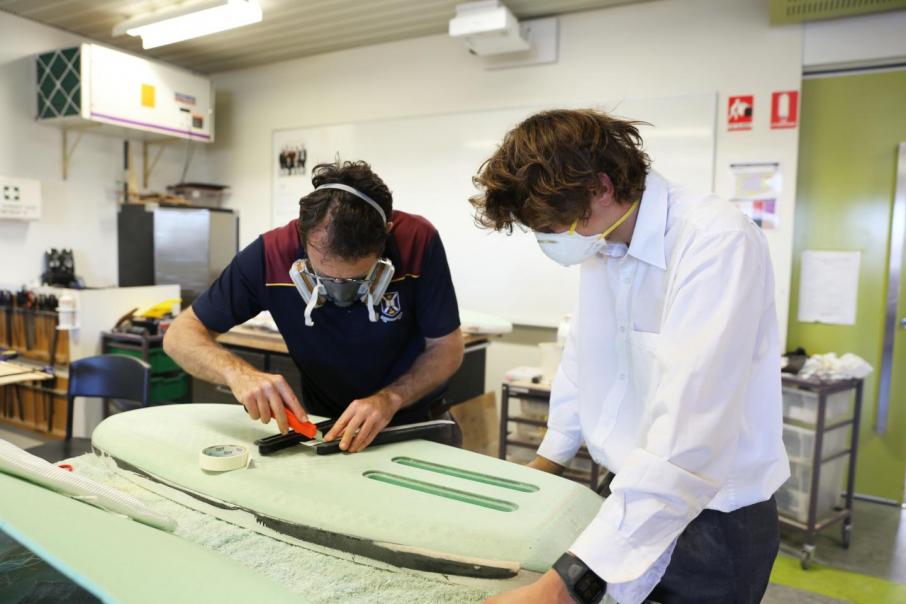Once dominated by rote learning and set securely in the classroom, schools are increasingly stepping beyond these bounds to challenge, inspire and provoke. At Scotch College, this shift stretches across Pre-Kindergarten to Year 12.


Once dominated by rote learning and set securely in the classroom, schools are increasingly stepping beyond these bounds to challenge, inspire and provoke.
At Scotch College, this shift stretches across Pre-Kindergarten to Year 12.
Engagement is bolstered through Nature School – a nature-focused play program – in the early years and an extensive enrichment program, known as Tàlantach after the Scottish Gaelic, for talented students from Year 3 onwards.
Scotch’s enrichment and extension program goes well beyond mainstream curriculum offerings.
Led by the College’s Head of Enrichment Sam Sterrett and assisted by literacy, numeracy and STEM enrichment experts Jeannette Weeda, Oscar Burke and Steve McLean, the enrichment program emphasises a balanced education.
For talented students, this means embracing intellectual humility and a community service mindset – two factors that Mr Sterrett says are critical to healthy social and emotional development.
“With students of particularly high academic ability, there can be an asynchrony, or unevenness, to their intellectual and emotional development,” Mr Sterrett says
“At Scotch, we aim to give our students strategies to deal with this asynchrony through our enrichment program. Some students might have an incredible aptitude for mathematics but struggle socially. To support this, we have students of similar ability interacting and working together in project-based environments, regardless of age and year group, which also provides mentorship opportunities for older and younger students. For instance, a gifted Year 7 student might be working with kids in Year 9. It’s this vertical integration in our enrichment program that helps our talented students to feel socially connected and accepted, where they might otherwise feel isolated.”

Headmaster Dr Alec O’Connell says the College’s ability to fluidly integrate the younger and older years is what makes Scotch’s education particularly unique.
“Our older students gain opportunities to lead, mentor, recognise and adapt to the needs of those around them, all the while gaining self-confidence,” Dr O’Connell said.
“And for our younger students, what could be more engaging than learning from your school leaders? We hope that this experience inspires them to become more actively involved in their school and the wider world and to give back in turn.”
In a new maths enrichment program, alumni William Steinberg (OSC 2020), Drummond Orr (OSC 2016) and Brodie Stephenson (OSC 2016) returned to work with Scotch’s maths enrichment students across Years 6 to 10.
The three past students shared their real-life applications of maths in their working lives and tertiary study with the expanded enrichment class, demonstrating the ways you can be creative with maths, and supported them as they tackled the classic order-of-magnitude challenge: the Fermi problem.
Mr Steinberg has been accepted to study Mathematics at Cambridge University’s renowned Trinity College while Mr Orr has received a scholarship from Oxford University to study a masters investigating the economic interventions required to improve mental health. Working with the Bank of America, Mr Stephenson uses financial modelling to predict a company’s value.
Scotch College also hosts a Scholar-in-Residence, Akram Azimi. Currently a sociology PhD candidate at the University of Western Australia, Mr Azimi is a former Young Australian of the Year (2013), recipient of the UWA Hackett Scholarship and lectures in property law at Murdoch University.
Mr Azimi works with Scotch’s Year 8 students every Friday, where he challenges them to use “integrative thinking” to solve problems that require an understanding of multiple disciplines.
Mr Sterret says the Friday lectures are an opportunity to introduce new ways of thinking and encourage students to draw fresh conclusions about the world in which we live.
“They’ve delved into the gift economy, still practised by Melanesian societies where social capital in the tribe grows when you gift things to others and the goal, therefore, is to give,” Mr Sterrett said.
“Learning about other societies is an important way to reflect on our own society and the political, economic and social systems that reinforce it.”
Scotch’s opportunities for extension and enrichment run across subject disciplines, including music, design and technology, STEM, creative writing, coding and Tournament of the Minds.
In 2020, design and technology and the Year 10 community service program partnered to build and donate 3D printers to primary schools.
Year 10 students researched design software, developed a project plan and assembled open-source 3D printers without assistance or instruction. They then ran a workshop for Year 7 students on how to design in 3D and print prototypes.
Not only did they learn valuable STEM and problem-solving skills, but they also gained experience in mentoring and teaching others.
Scotch’s goal is to create projects that appeal to students’ passions without having an end goal. Each design and technology enrichment project integrates with other disciplines, such as community service, music or sport.
Once the project is complete, there are opportunities for continued learning, service to the community, personal development and leadership.
The College teaches music from Pre-Kindergarten upwards, with opportunities for enrichment available throughout.
Scotch’s Music Curriculum Coordinator Jennifer Sullivan says the College draws on significant research that shows the powerful connection between music and the brain.
“According to studies, musicians have high levels of executive function, highly developed memory systems and can solve problems and puzzles creatively and effectively,” Mrs Sullivan said.
“Executive function is essentially the set of mental skills used when solving complex problems involving logical, conceptual, strategic and emotional elements.
“Neuroscientists found that participating in music education raises students’ general cognitive capacity and discovered that the greatest gains can be for students undertaking regular music activities before the age of seven.”
Learn more about Scotch College’s Tàlantach: gifted and talented program on a school tour. Book your tour now.






